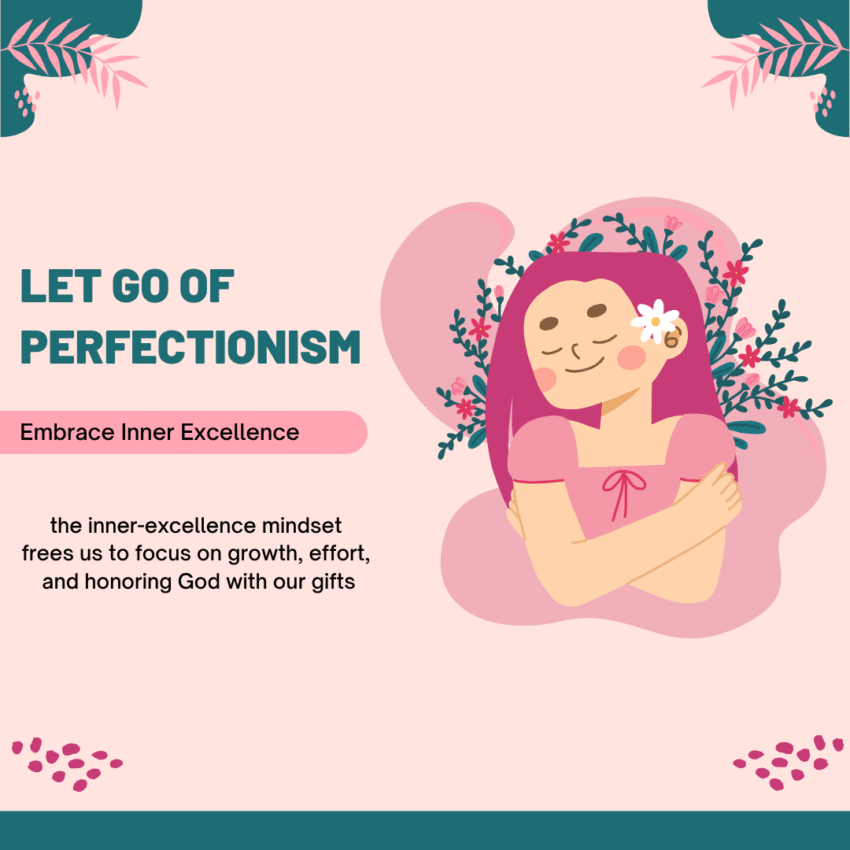I have been doing a series on Mindset shifts. Each installment of this series is a standalone, but they all deal with our mindset. I love addressing the topic of mindsets from a Christian perspective. I think most of our formal education has been about what to think and not how to think. As a Christian, believing God is our creator, and that he’s given us free will and a thinking brain, I love to explore thinking about our thinking. I believe our greatest gift is our ability to make decisions. We take this gift for granted. Looking at a perfectionism mindset vs. an inner-excellence mindset should be eye-opening.
I can get stuck in the perfectionism mindset drama. It subtly sneaks in. I know I’m in this mindset when fear sets in. I like to do well; I have a competitive nature. I think that’s why I like to play and watch sports. I like the study of business and entrepreneurs—watching people strive to do well, to improve, and get better. I am attracted to all of it. But this is where the problem lies. The perfectionism trap leads to overthinking, overwhelm, fear of failure, staying in our comfort zone, comparison, people pleasing, playing small, and paralysis by analysis. I have been in this place, and felt all of these feelings, until I learned I could do something about it.
Let’s first look at the difference between these two mindsets
Perfectionism Mindset
- Our Focus is obsessed with achieving flawlessness and meeting unrealistic standards.
- Our self-worth becomes tied to outcomes; failure is seen as a reflection of our personal inadequacy.
- Our mistakes are intolerable, leading to harsh self-criticism and fear of failure.
- Perfectionism is solely outcome-focused, disregarding the learning and growth process.
Inner-Excellence Mindset
- Our focus strives for high, but achievable standards while valuing effort and improvement.
- Our self-worth is stable and not entirely dependent on success or failure.
- Our mistakes are viewed as opportunities for learning and growth, not as personal flaws.
- Inner excellence values the journey, including relationships, creativity, and problem-solving.
In essence, perfectionism is rigid and fear-driven, while inner excellence is flexible, growth-oriented, and process-focused.
Perfectionism is inherently self-centered, rooted in a desire to meet the world’s definition of success and gain external validation. It focuses on personal achievement and flawlessness, often at the cost of joy and peace—which makes mistakes unbearable.
In contrast, as Christians, an inner-excellence mindset shifts our focus outward, seeking to glorify God and serve others with the gifts he has given us. Our worth is not tied to performance or worldly acceptance but is firmly grounded in our identity as loved children of God. Inner excellence allows us to grow humbly, embracing mistakes as opportunities for growth while striving to honor God through our efforts.
Here are two scriptures that support the inner-excellence mindset
- Colossians 3:23-24: “Whatever you do, work heartily, as for the Lord and not for men, knowing that from the Lord you will receive the inheritance as your reward. You are serving the Lord.”
- Ephesians 2:8-9: “For by grace you have been saved through faith. And this is not your own doing; it is the gift of God, not a result of works, so that no one may boast”.
We do not need to prove our worth. This is one of Satan’s most powerful lies.
I’m going to share with you some areas where I get caught up in the perfectionism mindset. Your personal stories will be different from mine, but I want to illustrate how the perfectionism mindset sneaks in so subtly.
I often share that I play tennis. I love it, it keeps me somewhat fit, I love the social aspect of it, it gets me outdoors, and I also enjoy the competitive part of it. I play in women’s USTA tennis league in my hometown. Perfection is the kiss of death when it comes to playing tennis. If I care more about winning and others validation when I win, and I focus on that, my game falls apart. I put so much pressure on myself, I tighten up, I overthink, I get caught up on the future outcome, I make mistakes, I stop enjoying playing and get irritated with myself. In this state I usually lose.
Sometimes I do this same thing when I’m writing and recording podcast episodes. When a perfectionism mindset becomes my mindset, the same thing happens. I tighten up. The ideas for an episode stop flowing. I start worrying too much, not just that the episode is not perfect, but that it’s terrible. My mind starts getting distracted. I want to start scrolling on social media, text a friend, anything but sit here in this place. I’m basically trying too hard. Then comes the self-doubt, comparing myself to successful podcasters or other successful business women. I stop enjoying what I’m doing. I’m thinking about myself and the outcome. I can go into overwhelm, procrastination, and fear—which are the worst places to be to create. I create better from a of a place of love and service.
Those are my examples. What came to mind for you? Where and when do you fall into the perfectionism mindset? Can you see how destructive this mindset can be and how It destroys our peace and joy?
What Can We Do About It
I recently read (listened to on audible) Inner Excellence by Jim Murphy—which I highly reccommend. Here are the action steps I pulled from his book.
- Focus on What You Can Control (your effort, being fully present in the task). Shift your attention from external outcomes (winning, validation) to internal factors like effort, attitude, and preparation. Ask yourself: “What can I learn from this experience?” This reduces pressure and keeps you present.
- Cultivate Gratitude and Joy in the Process. Begin each day by listing three things you’re grateful for and reflect on what you enjoy about the activity (e.g., tennis or podcasting). Gratitude shifts your focus from scarcity to abundance and helps you embrace the journey rather than obsess over results. Take your mindset off yourself. Replace it with a service focused mindset.
- Reframe Mistakes as Growth Opportunities. Instead of seeing mistakes as failures, view them as chances to improve and learn. This growth-oriented mindset fosters resilience and reduces fear of judgment, allowing creativity and performance to flow naturally. Life is about experimenting, thinking “if this doesn’t work I’ll try something else.”
- Develop Emotional Mastery (rewritten in my own words, God has given us this task as maturing Christian’s.) Practice renewing of our minds thru scripture and prayer (as I often share, this is my morning routine). Detach from perfectionist thoughts. When overwhelmed, pause and ask: “Am I focused on the process or the outcome?” This helps you stay grounded and aligned with your purpose.
Self-reflection questions to ask yourself to determine if you’re in a perfectionism mindset:
- Am I focusing more on the destination than the journey?
- Does a small mistake feel like a total failure?
- Am I avoiding tasks I’m not immediately excellent at?
- Is my self-worth tied to achieving flawless results?
The perfectionism mindset traps us in fear, overthinking, and a relentless pursuit of flawlessness—tying our worth to outcomes and leaving us paralyzed by mistakes. In contrast, the inner-excellence mindset frees us to focus on growth, effort, and honoring God with our gifts. It values the process over perfection, allowing us to embrace mistakes as opportunities to learn and serve others. Shifting from perfectionism to inner excellence brings peace and joy because it aligns our purpose with God’s grace, not worldly validation. Reflect on where you’ve been stuck in perfectionism and take steps toward inner excellence—it works!

Monette hosts a weekly podcast: Mornings with Monette. She has been a lifelong learner and and appreciates the opportunity to share what she has learned–both through her podcast and here at The Best-Life Project (based on the content of her weekly podcast). Her messages are raw, honest and straight from the heart. She lives in Albuquerque, NM with her husband Leland. They have three adult children and are enjoying living their best lives filled with travel and adventure.


Monette, Thank you! Fear really can and does paralyze us on so many fronts. Oh how I have “been there and done that.” One of the first scripture verse(s) my son learned in his 1st grade class was Colossians 3:23-24. I am thankful it is in his heart AND was re-ignited in mine years ago. But as you said, putting it into action is the key!!!